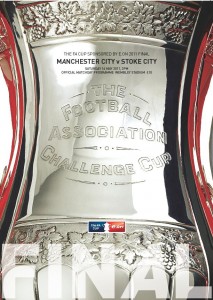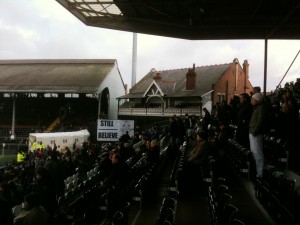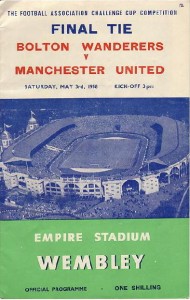Friday 06 January 2012 (01.00 pm)
So here we are in 2012 and the FA Cup 3rd Round which extends to four days, starting tonight with the North-West derby between Premier League Liverpool and League One Oldham Athletic, ending on Monday with the game at The Emirates between Arsenal and Leeds United.
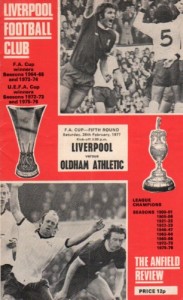 Liverpool last met Oldham in the Cup at Anfield in the 5th Round in the 1976/77 season. Liverpool made the Final that year, only to lose to Manchester United. With the Reds already in the League Cup Semi-Final, Kenny Dalglish will be relishing another Cup run. Oldham beat Burton 3-1 in the 1st Round and after a replay, overcame Southend United 1-0 at Boundary Park. Just as Liverpool have progressed in the League Cup, The Latics have had a good year in the knock-out competitions, having made it to the Johnstone’s Paint Trophy North Final against Chesterfield and are just one match away from a Wembley appearance.
Liverpool last met Oldham in the Cup at Anfield in the 5th Round in the 1976/77 season. Liverpool made the Final that year, only to lose to Manchester United. With the Reds already in the League Cup Semi-Final, Kenny Dalglish will be relishing another Cup run. Oldham beat Burton 3-1 in the 1st Round and after a replay, overcame Southend United 1-0 at Boundary Park. Just as Liverpool have progressed in the League Cup, The Latics have had a good year in the knock-out competitions, having made it to the Johnstone’s Paint Trophy North Final against Chesterfield and are just one match away from a Wembley appearance.
No doubt the Reds will juggle their pack for the game, but they will have to be wary of an Oldham team that manager Paul Dickov will have fired up for the occasion. It could be quite a tie tonight.
Friday 06 January 2012 (11.00 pm)
Liverpool (2) 5 – 1 (1) Oldham Athletic
Football is a game riddled with clichés – and there is a reason for this, they are invariably true. Take the Cup-tie this evening. Let’s start with, “…you have to take your chances…” Oldham started the game brilliantly and had three excellent goal scoring opportunities in the opening twenty minutes. None were taken and instead of having any sort of lead the game remained at 0-0. However, the Latics did eventually score through Robbie Simpson, with a stunning thirty yard strike on twenty eight minutes. “…Teams are at their most vulnerable just after they have scored…” Oldham didn’t take heed and Liverpool were level just two minutes later through Craig Bellamy. “…The worst time to concede is just before half-time…” With time added on at the end of the first half Oldham gave away a penalty and Steven Gerrard did the rest to send the home team in with a 2-1 lead.
The visitors came out fighting the second half but were killed off on sixty eight minutes when Shelvey slotted in to give Liverpool a 3-1 lead. Finally, “…the score-line didn’t reflect the game…” To rub salt into the wounds Oldham conceded two late goals to Andy Carroll and Stewart Downing; 5-1 was harsh on The Latics. So Liverpool are through and the they can put their feet up and watch the rest of the Third Round unfold.
Saturday 07 January 2012 (10.00 am)
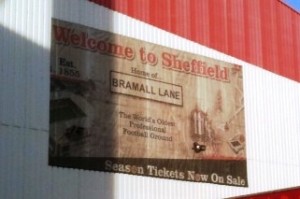 It’s a return to Bramall Lane today as The Blades face Blue Square Bet Conference South opposition (and lowest ranked team in the Third Round), Salisbury City. The Whites have hardly set their League alight this season and currently sit in the lower half of the League table. However, the FA Cup has been a real adventure for the team from Wiltshire. City entered the FA Cup at the Second Qualifying Round stage, beating Southern League Premier side Swindon Supermarine 3-0. Poole Town were demolished 6-1 by Salisbury in the Third Qualifying Round and entry into the First Round was clinched with a 2-1 away win at Bishop’s Stortford. Arlesey Town were no match for The Whites as City won 3-1 and earned a Second Round tie at home to Conference Premier side Grimsby Town. The tie went to a replay after a 0-0 draw at The Raymond McEnhill Stadium. The replay at Blundell Park turned out to be a night of drama. Dan Fitchett gave City the lead in the second half and it looked enough to take The Whites through. However, in time added-on Rob Duffy headed Grimsby level. In extra-time Duffy scored again to put The Mariners ahead, but back came City and Brian Dutton brought the scores level at 2-2. The Cup upset was complete with eight minutes to go, when Stuart Anderson converted a penalty to put Salisbury into the FA Cup Third Round for the first time in their history.
It’s a return to Bramall Lane today as The Blades face Blue Square Bet Conference South opposition (and lowest ranked team in the Third Round), Salisbury City. The Whites have hardly set their League alight this season and currently sit in the lower half of the League table. However, the FA Cup has been a real adventure for the team from Wiltshire. City entered the FA Cup at the Second Qualifying Round stage, beating Southern League Premier side Swindon Supermarine 3-0. Poole Town were demolished 6-1 by Salisbury in the Third Qualifying Round and entry into the First Round was clinched with a 2-1 away win at Bishop’s Stortford. Arlesey Town were no match for The Whites as City won 3-1 and earned a Second Round tie at home to Conference Premier side Grimsby Town. The tie went to a replay after a 0-0 draw at The Raymond McEnhill Stadium. The replay at Blundell Park turned out to be a night of drama. Dan Fitchett gave City the lead in the second half and it looked enough to take The Whites through. However, in time added-on Rob Duffy headed Grimsby level. In extra-time Duffy scored again to put The Mariners ahead, but back came City and Brian Dutton brought the scores level at 2-2. The Cup upset was complete with eight minutes to go, when Stuart Anderson converted a penalty to put Salisbury into the FA Cup Third Round for the first time in their history.
However, it has not all been plain sailing for The Whites in recent years. In 2007/08 City were promoted to the Conference Premier Division and in their first season finished a creditable 12th. In the following season Salisbury finished 16th but off the pitch all was not well as financial problems hit the club. City completed the 2009/10 season in 12th place, even after being deducted 10 points for entering administration. Further punishment came The Whites way when they were demoted two divisions (to the Southern League Premier Division) for breaking Conference finance rules. Despite this set-back, last season City started the climb back up the Leagues after gaining promotion to the Blue Square Bet Conference South following victory over Hednesford Town in the Play-Off Final.
 The Cup is full of superstition and coincidence and for The Blades there has been a bit of a pattern in their two FA cup fixtures this season. In both games Sheffield United have been at home, have scored three goals in each game, with Ched Evans scoring two goals in each fixture. The Blades opponents in both Rounds have been from the Npower League One, both Oxford and Torquay wore all yellow strips and both clubs like Sheffield are ‘United’s’. Many of these coincidences are broken today by the visit of Salisbury City, but will Sheffield United manage three goals today? Will Ched Evan’s bag another brace?
The Cup is full of superstition and coincidence and for The Blades there has been a bit of a pattern in their two FA cup fixtures this season. In both games Sheffield United have been at home, have scored three goals in each game, with Ched Evans scoring two goals in each fixture. The Blades opponents in both Rounds have been from the Npower League One, both Oxford and Torquay wore all yellow strips and both clubs like Sheffield are ‘United’s’. Many of these coincidences are broken today by the visit of Salisbury City, but will Sheffield United manage three goals today? Will Ched Evan’s bag another brace?
Saturday 07 January 2012 (11.20 pm)
Sheffield United (1) 3 – 1 (0) Salisbury City
Before kick-off there was a minute’s applause as a mark of respect at the death last week of Gary Ablett. He was known predominantly for his time at Liverpool and Everton, but Gary Ablett also had a loan spell at Bramall Lane in 1996. Both sets of supporters observed the tribute respectfully.
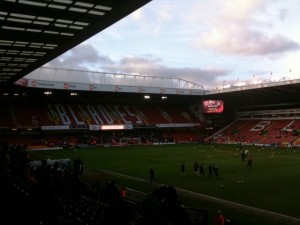 Of the game itself, this was always going to be a difficult one for Salisbury given the recent good form of The Blades and the difference in league status between the teams. Sheffield United dominated from the outset, never allowing the visitors to settle on the ball. Within the opening fifteen minutes United had created a number of excellent chances, with Neil Collins header superbly saved by Mark Scott, the best of the opportunities. The Blades were patient in their build-up and were using the wings and switching play to drag the Salisbury defence out of position. This ploy paid off on eighteen minutes when a cross-field ball by Kevin McDonald was picked up by Lee Williamson who drove at the City defence. His pass found space beyond the Salisbury back-line and Chris Porter slipped it in under the advancing Scott to put United ahead. The Blades continued to press and City were thankful that keeper Scott was in such good form as he saved well from Ryan Flynn and Chris Porter. However, United couldn’t increase their lead and went in at the interval just one goal to the good.
Of the game itself, this was always going to be a difficult one for Salisbury given the recent good form of The Blades and the difference in league status between the teams. Sheffield United dominated from the outset, never allowing the visitors to settle on the ball. Within the opening fifteen minutes United had created a number of excellent chances, with Neil Collins header superbly saved by Mark Scott, the best of the opportunities. The Blades were patient in their build-up and were using the wings and switching play to drag the Salisbury defence out of position. This ploy paid off on eighteen minutes when a cross-field ball by Kevin McDonald was picked up by Lee Williamson who drove at the City defence. His pass found space beyond the Salisbury back-line and Chris Porter slipped it in under the advancing Scott to put United ahead. The Blades continued to press and City were thankful that keeper Scott was in such good form as he saved well from Ryan Flynn and Chris Porter. However, United couldn’t increase their lead and went in at the interval just one goal to the good.
In the opening fifteen minutes of the second half, Salisbury had a sustained period of possession, without really creating a guilt edged goal chance. However, the game swung firmly in favour of the home side, when on the hour mark after a goal-mouth scramble, McDonald’s shot was fortuitously deflected in by Ched Evans, to maintain his record of scoring in every round so far. United were now comfortable and continued to create chances. One such opportunity included a scramble which saw efforts by Ched Evans, James Beattie and Michael Doyle all repelled in a frantic passage of play. Eventually though The Blades scored again. On seventy two minutes the ever dangerous Evans cut inside and drove a cross shot into the Salisbury penalty area, which Danny Webb deflected into his own net. With the game won, The Blades intensity dropped and Salisbury enjoyed more possession in the last five minutes. The travelling City fans were rewarded for their excellent support of their team when substitute Lloyd Macklin fired in on eighty six minutes. Salisbury buzzed around for the closing minutes, but were unable to trouble The Blades defence further.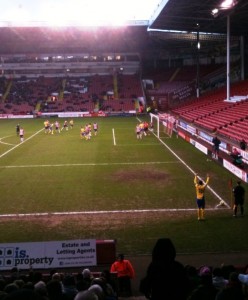
Another Cup win for United and their record of scoring three goals in each Round continues. Will the draw tomorrow see The Blades at home again? For now one half of Sheffield can look forward to the draw. The blue and white half has their chance to progress on Sunday with a difficult looking tie with West Ham to come. This is one of four fixtures on Sunday, which also includes, the Manchester derby (City v United), a repeat of the 2010 FA Cup Final (Chelsea v Portsmouth) and The Posh against The Black Cats (Peterborough v Sunderland).
Sunday 08 January 2012 (6.00pm)
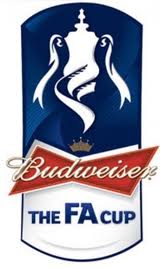 In terms of the other Cup “trail” fixtures, there was little romance or Cup magic. Aston Villa won comfortably at Bristol Rovers 3-1. A Marc Albrighton goal on thirty five minutes gave Villa a half-time lead. Gabriel Agbonlahor (a second half substitute) doubled the lead just after the hour mark and Ciaran Clarke added a third on seventy eight minutes. Rovers got a goal back on ninety minutes through Scott McGleish and he could have brought even more respectability to the score-line, but McGleish had a penalty saved in time added on. Premier League Fulham overcame League One leaders Charlton Athletic with a convincing 4-0 win. Clint Dempsey scored a hat-trick with Damien Duff scoring The Cottagers final goal. League Two Macclesfield sniffed an upset in their tie with Premier League Bolton, when Arnaud Mendy put them 2-1 ahead with twenty two minutes remaining. However, David Wheater headed Wanderers level after seventy seven minutes to take the game back to a replay at The Reebok Stadium.
In terms of the other Cup “trail” fixtures, there was little romance or Cup magic. Aston Villa won comfortably at Bristol Rovers 3-1. A Marc Albrighton goal on thirty five minutes gave Villa a half-time lead. Gabriel Agbonlahor (a second half substitute) doubled the lead just after the hour mark and Ciaran Clarke added a third on seventy eight minutes. Rovers got a goal back on ninety minutes through Scott McGleish and he could have brought even more respectability to the score-line, but McGleish had a penalty saved in time added on. Premier League Fulham overcame League One leaders Charlton Athletic with a convincing 4-0 win. Clint Dempsey scored a hat-trick with Damien Duff scoring The Cottagers final goal. League Two Macclesfield sniffed an upset in their tie with Premier League Bolton, when Arnaud Mendy put them 2-1 ahead with twenty two minutes remaining. However, David Wheater headed Wanderers level after seventy seven minutes to take the game back to a replay at The Reebok Stadium.
The games today started in dramatic fashion with an incredible first half at The Etihad Stadium. Debate will rage over whether the sending off of City captain Kompany was the right one. However, United lead 3-0 at the break with a Rooney double and a well taken Danny Welbeck volley. Credit to City who reorganised in the second half and not only stifled their Manchester cousins, but clawed their way back into the game with goals from Kolarov and Aguero. 3-2 the final score in an incident packed derby.
With their city rivals already through, Sheffield Wednesday had a difficult home game with high-flying Championship team West Ham United. However, The Owls came through after keeper Nicky Weaver saved a second half penalty from Sam Baldock. With a replay looming, Chris O’Grady struck for Wednesday on eighty eight minutes to clinch a 1-0 win and create a Cup upset.
Portsmouth held Chelsea for the first forty five minutes at Stamford Bridge, but two goals from Ramires, and one each from Mata and Lampard ensured the London club went into the Fourth Round draw. Also going through are Sunderland with a professional 2-0 win at Peterborough. Sebastian Larsson put the Black Cats ahead on forty eight minutes and the game was wrapped up just ten minutes later with a goal from James McLean.
For the Fourth Round, the “trail” fixtures are as following:
Arsenal/Leeds United v Aston Villa
Everton v Fulham
Macclesfield/Bolton Wanderers v Swansea City
Sheffield United v Birmingham City/Wolves
Monday 09 January 2012 (7.00am)
The last game of the FA Cup Third Round takes place later today in North London between Arsenal and Leeds United. These two teams have met on sixteen occasions and have produced some memorable matches.
The first meeting was back in the 1949/50 season in the Sixth Round at Highbury, when First Division Arsenal took on Second Division Leeds United. United acquitted themselves well, but lost 1-0 to a goal from Reg Lewis on 52 minutes. The Gunners went onto the Final that year at Wembley where they beat Liverpool 2-0.
The next meeting for these teams was in the 1972 Centenary FA Cup Final, when Allan Clarke scored the only goal which meant the Cup went North to Elland Road for the first time in their history, with the clipped commentary of David Coleman declaring, “…Clarke…One Nil…” sweet music to the ears of Leeds supporters.
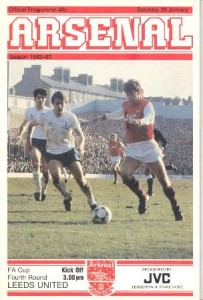 By the time these teams met again in the Cup (1982/83), Leeds had once more been relegated to the Second Division. A Peter Nicholas own goal just after the hour gave Leeds the lead, but Arsenal were level within a minute as Alan Sunderland sent the game to a replay. In the game at Elland Road, an upset looked on the cards as Aidan Butterworth put Leeds ahead in the last minute of extra-time. However, Graham Rix dramatically scored an equaliser with seconds remaining to force a Second Replay. A coin was tossed to see who would host the Second Replay and it fell in favour of the Londoners. Tony Woodcock put The Gunners ahead, only for Terry Connor to bring the game level. However, with eight minutes remaining, Graham Rix proved to be the Arsenal saviour as he scored the winner to take them through 2-1.
By the time these teams met again in the Cup (1982/83), Leeds had once more been relegated to the Second Division. A Peter Nicholas own goal just after the hour gave Leeds the lead, but Arsenal were level within a minute as Alan Sunderland sent the game to a replay. In the game at Elland Road, an upset looked on the cards as Aidan Butterworth put Leeds ahead in the last minute of extra-time. However, Graham Rix dramatically scored an equaliser with seconds remaining to force a Second Replay. A coin was tossed to see who would host the Second Replay and it fell in favour of the Londoners. Tony Woodcock put The Gunners ahead, only for Terry Connor to bring the game level. However, with eight minutes remaining, Graham Rix proved to be the Arsenal saviour as he scored the winner to take them through 2-1.
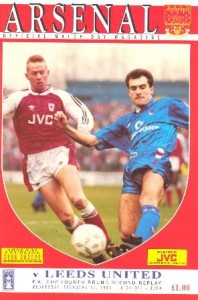 Given the change of rules regarding replays, the events of the 1990/91 ties will never be repeated. Arsenal and Leeds needed four games to settle this Fourth Round tie. Sadly today in the current FA Cup competition, all teams get is a replay, extra-time and the cruelty of penalties. Those epic ties were part of the history and tradition of the FA Cup – and people wonder why some magic has gone out of the competition. The original tie at Highbury ended 0-0 and the replay at Elland Road resulted in a 1-1 draw. Lee Chapman put United ahead, with Anders Limpar replying for The Gunners. Back at Highbury in the Second Replay, the stalemate continued with a goalless draw. The tie was finally won by Arsenal 2-1 at Elland Road, with Paul Merson and Lee Dixon on the score sheet.
Given the change of rules regarding replays, the events of the 1990/91 ties will never be repeated. Arsenal and Leeds needed four games to settle this Fourth Round tie. Sadly today in the current FA Cup competition, all teams get is a replay, extra-time and the cruelty of penalties. Those epic ties were part of the history and tradition of the FA Cup – and people wonder why some magic has gone out of the competition. The original tie at Highbury ended 0-0 and the replay at Elland Road resulted in a 1-1 draw. Lee Chapman put United ahead, with Anders Limpar replying for The Gunners. Back at Highbury in the Second Replay, the stalemate continued with a goalless draw. The tie was finally won by Arsenal 2-1 at Elland Road, with Paul Merson and Lee Dixon on the score sheet.
The Fourth Round game at Highbury in 1993 once again proved to be classic. Lee Chapman and Gary Speed had given Leeds a 2-0 half-time lead and seemed to be enough to send them through to the Fifth Round. However, Arsenal clawed their way back with goals from Ray Parlour and Paul Merson for a 2-2 draw. The replay at Elland Road proved to be just as memorable. Alan Smith put Arsenal ahead, but goals from Carl Shutt and Gary McAllister gave Leeds a 2-1 advantage. It looked all up for The Gunners as full-time loomed. However, Ian Wright levelled to send the game into extra-time and he grabbed his second and the Arsenal winner with three minutes left on the clock.
By comparison the next two FA Cup meetings between these rivals were tame. In the Fourth Round of the 1996/97 competition, ex-Arsenal boss George Graeme returned to Highbury with his Leeds United charges. In a well organised display a goal on 12 minutes from Rod Wallace was enough to sent Leeds through. Seven year later, Arsenal travelled to Elland Road for a Third Round tie. Mark Viduka gave United an early lead, but goals from Henry, Edu, Pires and Toure gave The Gunners a comfortable 4-1 win in a season which saw also Leeds relegated from the Premier League.
So to the most recent Cup encounter, which took place last season at The Emirates, Leeds took the game to Arsenal and lead 1-0 through a Robert Snodgrass penalty. With ninety minutes on the clock, and the Leeds fans whistling for full-time, Arsenal were awarded a penalty of their own. Up stepped Cesc Fabregas score and set up a replay at Leeds. At Elland Road, The Gunners got off to a flying start and were ahead within five minutes through Sami Nasri. Arsenal seemed to be cruising when on thirty five minutes Sagna doubled their lead. However, within two minutes Bradley Johnson dragged Leeds back into the tie. On this occasion there was no comeback for United and a Robin Van Persie goal with just less than fifteen minutes to go, sent the team from London through. There has been some drama over the years, will the 2011/12 tie live up to some of the classic encounters?
Monday 09 January 2012 (10.00pm)
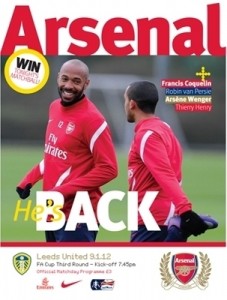 So what a way to end the Third Round action. The game overall could not be considered to be a classic, but in “Roy of the Rovers” fashion, Thierry Henry returned to his spiritual footballing home and scored the winner against Leeds. The first half had few highlights and it seemed as though the second half was going the same way. However, on sixty eight minutes the home crowd came to life when Henry came on for Chamakh and within ten minutes the fairy-tale return was complete as he scored from Alex Song’s through ball. Leeds never really threatened to spoil King Henry’s return as the final minutes ticked away.
So what a way to end the Third Round action. The game overall could not be considered to be a classic, but in “Roy of the Rovers” fashion, Thierry Henry returned to his spiritual footballing home and scored the winner against Leeds. The first half had few highlights and it seemed as though the second half was going the same way. However, on sixty eight minutes the home crowd came to life when Henry came on for Chamakh and within ten minutes the fairy-tale return was complete as he scored from Alex Song’s through ball. Leeds never really threatened to spoil King Henry’s return as the final minutes ticked away.
Arsenal loves Thierry Henry and Thierry Henry loves Arsenal.
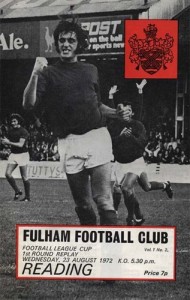 Later today I’m off to Elland Round to watch a First Round game between Leeds United and Shrewsbury Town, but my mind is drawn back to the first League Cup tie I saw forty years ago in August 1972. The game was at Craven Cottage as Fulham took on Reading. At that time, the League Cup was not sponsored and as with the FA Cup, back then, there was no limit on replays. The game, which took place on 23 August, was in fact a First Round replay, as the original game at Reading ended in a draw. If I’m honest I remember very little about the game, other than it also ended 1-1.
Later today I’m off to Elland Round to watch a First Round game between Leeds United and Shrewsbury Town, but my mind is drawn back to the first League Cup tie I saw forty years ago in August 1972. The game was at Craven Cottage as Fulham took on Reading. At that time, the League Cup was not sponsored and as with the FA Cup, back then, there was no limit on replays. The game, which took place on 23 August, was in fact a First Round replay, as the original game at Reading ended in a draw. If I’m honest I remember very little about the game, other than it also ended 1-1.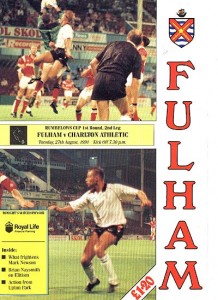 The League Cup also holds a sentimental memory for me in relation to another First Round game. This one took place on 27 August 1991. By then the League Cup was sponsored by Rumbelows and the First Round fixtures were played over two-legs. Fulham hadn’t quite hit the low-point that the early nineties brought to SW6, but it was a club in decline, with Craven Cottage in a sorry state. In the First Leg, the Whites had gone down 4-2 to an exiled Charlton Athletic who were playing at Upton Park, so it was more in hope than expectation that I joined a crowd of 3,543 for the Second Leg encounter. Fulham battled but a 1-1 draw meant an aggregate loss of 5-3.
The League Cup also holds a sentimental memory for me in relation to another First Round game. This one took place on 27 August 1991. By then the League Cup was sponsored by Rumbelows and the First Round fixtures were played over two-legs. Fulham hadn’t quite hit the low-point that the early nineties brought to SW6, but it was a club in decline, with Craven Cottage in a sorry state. In the First Leg, the Whites had gone down 4-2 to an exiled Charlton Athletic who were playing at Upton Park, so it was more in hope than expectation that I joined a crowd of 3,543 for the Second Leg encounter. Fulham battled but a 1-1 draw meant an aggregate loss of 5-3.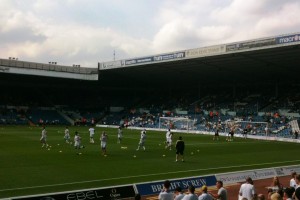
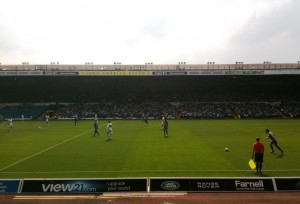
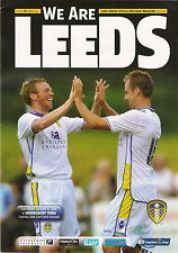 4-0 to Leeds at the whistle, but in all honesty, that was a flattering score-line. Whilst not denying that United were the better team over the ninety minutes and had taken their chances well, the opening twenty minutes were a very bumpy ride for Leeds. The team is undoubtedly still bedding in, but nobody should be fooled that this was a perfect display. Kenny, whilst comfortable with his shot-stopping, also gave evidence (with the spill in the second-half and his flapping at corners), that he will cost Leeds points this season. Peltier looked the pick of the back four, whilst Austin looked solid enough. For many of the others, they only really came into the game once Leeds had the two goal advantage. Shrewsbury played some nice football and looked useful in midfield and going forward, however at the back they were far from convincing and that will be a worry for manager Graham Turner.
4-0 to Leeds at the whistle, but in all honesty, that was a flattering score-line. Whilst not denying that United were the better team over the ninety minutes and had taken their chances well, the opening twenty minutes were a very bumpy ride for Leeds. The team is undoubtedly still bedding in, but nobody should be fooled that this was a perfect display. Kenny, whilst comfortable with his shot-stopping, also gave evidence (with the spill in the second-half and his flapping at corners), that he will cost Leeds points this season. Peltier looked the pick of the back four, whilst Austin looked solid enough. For many of the others, they only really came into the game once Leeds had the two goal advantage. Shrewsbury played some nice football and looked useful in midfield and going forward, however at the back they were far from convincing and that will be a worry for manager Graham Turner. One Northern Soul was first published in 2002 featuring the character Steven Bottomley and whose story is continued in the 2005 sequel, No More Heroes.
One Northern Soul was first published in 2002 featuring the character Steven Bottomley and whose story is continued in the 2005 sequel, No More Heroes. Liverpool last met Oldham in the Cup at Anfield in the 5th Round in the 1976/77 season. Liverpool made the Final that year, only to lose to Manchester United. With the Reds already in the League Cup Semi-Final, Kenny Dalglish will be relishing another Cup run. Oldham beat Burton 3-1 in the 1st Round and after a replay, overcame Southend United 1-0 at Boundary Park. Just as Liverpool have progressed in the League Cup, The Latics have had a good year in the knock-out competitions, having made it to the Johnstone’s Paint Trophy North Final against Chesterfield and are just one match away from a Wembley appearance.
Liverpool last met Oldham in the Cup at Anfield in the 5th Round in the 1976/77 season. Liverpool made the Final that year, only to lose to Manchester United. With the Reds already in the League Cup Semi-Final, Kenny Dalglish will be relishing another Cup run. Oldham beat Burton 3-1 in the 1st Round and after a replay, overcame Southend United 1-0 at Boundary Park. Just as Liverpool have progressed in the League Cup, The Latics have had a good year in the knock-out competitions, having made it to the Johnstone’s Paint Trophy North Final against Chesterfield and are just one match away from a Wembley appearance. It’s a return to Bramall Lane today as The Blades face Blue Square Bet Conference South opposition (and lowest ranked team in the Third Round), Salisbury City. The Whites have hardly set their League alight this season and currently sit in the lower half of the League table. However, the FA Cup has been a real adventure for the team from Wiltshire. City entered the FA Cup at the Second Qualifying Round stage, beating Southern League Premier side Swindon Supermarine 3-0. Poole Town were demolished 6-1 by Salisbury in the Third Qualifying Round and entry into the First Round was clinched with a 2-1 away win at Bishop’s Stortford. Arlesey Town were no match for The Whites as City won 3-1 and earned a Second Round tie at home to Conference Premier side Grimsby Town. The tie went to a replay after a 0-0 draw at The Raymond McEnhill Stadium. The replay at Blundell Park turned out to be a night of drama. Dan Fitchett gave City the lead in the second half and it looked enough to take The Whites through. However, in time added-on Rob Duffy headed Grimsby level. In extra-time Duffy scored again to put The Mariners ahead, but back came City and Brian Dutton brought the scores level at 2-2. The Cup upset was complete with eight minutes to go, when Stuart Anderson converted a penalty to put Salisbury into the FA Cup Third Round for the first time in their history.
It’s a return to Bramall Lane today as The Blades face Blue Square Bet Conference South opposition (and lowest ranked team in the Third Round), Salisbury City. The Whites have hardly set their League alight this season and currently sit in the lower half of the League table. However, the FA Cup has been a real adventure for the team from Wiltshire. City entered the FA Cup at the Second Qualifying Round stage, beating Southern League Premier side Swindon Supermarine 3-0. Poole Town were demolished 6-1 by Salisbury in the Third Qualifying Round and entry into the First Round was clinched with a 2-1 away win at Bishop’s Stortford. Arlesey Town were no match for The Whites as City won 3-1 and earned a Second Round tie at home to Conference Premier side Grimsby Town. The tie went to a replay after a 0-0 draw at The Raymond McEnhill Stadium. The replay at Blundell Park turned out to be a night of drama. Dan Fitchett gave City the lead in the second half and it looked enough to take The Whites through. However, in time added-on Rob Duffy headed Grimsby level. In extra-time Duffy scored again to put The Mariners ahead, but back came City and Brian Dutton brought the scores level at 2-2. The Cup upset was complete with eight minutes to go, when Stuart Anderson converted a penalty to put Salisbury into the FA Cup Third Round for the first time in their history. The Cup is full of superstition and coincidence and for The Blades there has been a bit of a pattern in their two FA cup fixtures this season. In both games Sheffield United have been at home, have scored three goals in each game, with Ched Evans scoring two goals in each fixture. The Blades opponents in both Rounds have been from the Npower League One, both Oxford and Torquay wore all yellow strips and both clubs like Sheffield are ‘United’s’. Many of these coincidences are broken today by the visit of Salisbury City, but will Sheffield United manage three goals today? Will Ched Evan’s bag another brace?
The Cup is full of superstition and coincidence and for The Blades there has been a bit of a pattern in their two FA cup fixtures this season. In both games Sheffield United have been at home, have scored three goals in each game, with Ched Evans scoring two goals in each fixture. The Blades opponents in both Rounds have been from the Npower League One, both Oxford and Torquay wore all yellow strips and both clubs like Sheffield are ‘United’s’. Many of these coincidences are broken today by the visit of Salisbury City, but will Sheffield United manage three goals today? Will Ched Evan’s bag another brace?  Of the game itself, this was always going to be a difficult one for Salisbury given the recent good form of The Blades and the difference in league status between the teams. Sheffield United dominated from the outset, never allowing the visitors to settle on the ball. Within the opening fifteen minutes United had created a number of excellent chances, with Neil Collins header superbly saved by Mark Scott, the best of the opportunities. The Blades were patient in their build-up and were using the wings and switching play to drag the Salisbury defence out of position. This ploy paid off on eighteen minutes when a cross-field ball by Kevin McDonald was picked up by Lee Williamson who drove at the City defence. His pass found space beyond the Salisbury back-line and Chris Porter slipped it in under the advancing Scott to put United ahead. The Blades continued to press and City were thankful that keeper Scott was in such good form as he saved well from Ryan Flynn and Chris Porter. However, United couldn’t increase their lead and went in at the interval just one goal to the good.
Of the game itself, this was always going to be a difficult one for Salisbury given the recent good form of The Blades and the difference in league status between the teams. Sheffield United dominated from the outset, never allowing the visitors to settle on the ball. Within the opening fifteen minutes United had created a number of excellent chances, with Neil Collins header superbly saved by Mark Scott, the best of the opportunities. The Blades were patient in their build-up and were using the wings and switching play to drag the Salisbury defence out of position. This ploy paid off on eighteen minutes when a cross-field ball by Kevin McDonald was picked up by Lee Williamson who drove at the City defence. His pass found space beyond the Salisbury back-line and Chris Porter slipped it in under the advancing Scott to put United ahead. The Blades continued to press and City were thankful that keeper Scott was in such good form as he saved well from Ryan Flynn and Chris Porter. However, United couldn’t increase their lead and went in at the interval just one goal to the good.
 In terms of the other Cup “trail” fixtures, there was little romance or Cup magic. Aston Villa won comfortably at Bristol Rovers 3-1. A Marc Albrighton goal on thirty five minutes gave Villa a half-time lead. Gabriel Agbonlahor (a second half substitute) doubled the lead just after the hour mark and Ciaran Clarke added a third on seventy eight minutes. Rovers got a goal back on ninety minutes through Scott McGleish and he could have brought even more respectability to the score-line, but McGleish had a penalty saved in time added on. Premier League Fulham overcame League One leaders Charlton Athletic with a convincing 4-0 win. Clint Dempsey scored a hat-trick with Damien Duff scoring The Cottagers final goal. League Two Macclesfield sniffed an upset in their tie with Premier League Bolton, when Arnaud Mendy put them 2-1 ahead with twenty two minutes remaining. However, David Wheater headed Wanderers level after seventy seven minutes to take the game back to a replay at The Reebok Stadium.
In terms of the other Cup “trail” fixtures, there was little romance or Cup magic. Aston Villa won comfortably at Bristol Rovers 3-1. A Marc Albrighton goal on thirty five minutes gave Villa a half-time lead. Gabriel Agbonlahor (a second half substitute) doubled the lead just after the hour mark and Ciaran Clarke added a third on seventy eight minutes. Rovers got a goal back on ninety minutes through Scott McGleish and he could have brought even more respectability to the score-line, but McGleish had a penalty saved in time added on. Premier League Fulham overcame League One leaders Charlton Athletic with a convincing 4-0 win. Clint Dempsey scored a hat-trick with Damien Duff scoring The Cottagers final goal. League Two Macclesfield sniffed an upset in their tie with Premier League Bolton, when Arnaud Mendy put them 2-1 ahead with twenty two minutes remaining. However, David Wheater headed Wanderers level after seventy seven minutes to take the game back to a replay at The Reebok Stadium.  By the time these teams met again in the Cup (1982/83), Leeds had once more been relegated to the Second Division. A Peter Nicholas own goal just after the hour gave Leeds the lead, but Arsenal were level within a minute as Alan Sunderland sent the game to a replay. In the game at Elland Road, an upset looked on the cards as Aidan Butterworth put Leeds ahead in the last minute of extra-time. However, Graham Rix dramatically scored an equaliser with seconds remaining to force a Second Replay. A coin was tossed to see who would host the Second Replay and it fell in favour of the Londoners. Tony Woodcock put The Gunners ahead, only for Terry Connor to bring the game level. However, with eight minutes remaining, Graham Rix proved to be the Arsenal saviour as he scored the winner to take them through 2-1.
By the time these teams met again in the Cup (1982/83), Leeds had once more been relegated to the Second Division. A Peter Nicholas own goal just after the hour gave Leeds the lead, but Arsenal were level within a minute as Alan Sunderland sent the game to a replay. In the game at Elland Road, an upset looked on the cards as Aidan Butterworth put Leeds ahead in the last minute of extra-time. However, Graham Rix dramatically scored an equaliser with seconds remaining to force a Second Replay. A coin was tossed to see who would host the Second Replay and it fell in favour of the Londoners. Tony Woodcock put The Gunners ahead, only for Terry Connor to bring the game level. However, with eight minutes remaining, Graham Rix proved to be the Arsenal saviour as he scored the winner to take them through 2-1. Given the change of rules regarding replays, the events of the 1990/91 ties will never be repeated. Arsenal and Leeds needed four games to settle this Fourth Round tie. Sadly today in the current FA Cup competition, all teams get is a replay, extra-time and the cruelty of penalties. Those epic ties were part of the history and tradition of the FA Cup – and people wonder why some magic has gone out of the competition. The original tie at Highbury ended 0-0 and the replay at Elland Road resulted in a 1-1 draw. Lee Chapman put United ahead, with Anders Limpar replying for The Gunners. Back at Highbury in the Second Replay, the stalemate continued with a goalless draw. The tie was finally won by Arsenal 2-1 at Elland Road, with Paul Merson and Lee Dixon on the score sheet.
Given the change of rules regarding replays, the events of the 1990/91 ties will never be repeated. Arsenal and Leeds needed four games to settle this Fourth Round tie. Sadly today in the current FA Cup competition, all teams get is a replay, extra-time and the cruelty of penalties. Those epic ties were part of the history and tradition of the FA Cup – and people wonder why some magic has gone out of the competition. The original tie at Highbury ended 0-0 and the replay at Elland Road resulted in a 1-1 draw. Lee Chapman put United ahead, with Anders Limpar replying for The Gunners. Back at Highbury in the Second Replay, the stalemate continued with a goalless draw. The tie was finally won by Arsenal 2-1 at Elland Road, with Paul Merson and Lee Dixon on the score sheet. So what a way to end the Third Round action. The game overall could not be considered to be a classic, but in “Roy of the Rovers” fashion, Thierry Henry returned to his spiritual footballing home and scored the winner against Leeds. The first half had few highlights and it seemed as though the second half was going the same way. However, on sixty eight minutes the home crowd came to life when Henry came on for Chamakh and within ten minutes the fairy-tale return was complete as he scored from Alex Song’s through ball. Leeds never really threatened to spoil King Henry’s return as the final minutes ticked away.
So what a way to end the Third Round action. The game overall could not be considered to be a classic, but in “Roy of the Rovers” fashion, Thierry Henry returned to his spiritual footballing home and scored the winner against Leeds. The first half had few highlights and it seemed as though the second half was going the same way. However, on sixty eight minutes the home crowd came to life when Henry came on for Chamakh and within ten minutes the fairy-tale return was complete as he scored from Alex Song’s through ball. Leeds never really threatened to spoil King Henry’s return as the final minutes ticked away.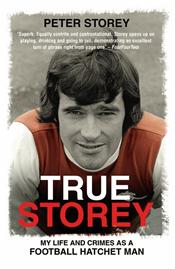 Growing up in the seventies, my football education came from my dad’s allegiance to The Arsenal and through me discovering my own team, Fulham. The game was a very different beast then. Football on the television consisted of highlights on a Saturday night with ‘Match of the Day’ and Sunday afternoons with ‘The Big Match’. Live football? Well that was one game a season, when the FA Cup Final was shown. Teams wore simple kits in traditional colours without a hint of advertising and played on pitches that varied between sand strewn mud-heaps and bare, rock hard surfaces. It was a time when football was a much more physical game and every First Division team had their ‘hard-man’. Chelsea had Ron Harris, there was Tommy Smith at Liverpool and Norman Hunter at Leeds United, whilst Arsenal had Peter Storey. So in reading “True Storey: My Life and Crimes as a Football Hatchet Man” I knew the footballing background against which the story is set.
Growing up in the seventies, my football education came from my dad’s allegiance to The Arsenal and through me discovering my own team, Fulham. The game was a very different beast then. Football on the television consisted of highlights on a Saturday night with ‘Match of the Day’ and Sunday afternoons with ‘The Big Match’. Live football? Well that was one game a season, when the FA Cup Final was shown. Teams wore simple kits in traditional colours without a hint of advertising and played on pitches that varied between sand strewn mud-heaps and bare, rock hard surfaces. It was a time when football was a much more physical game and every First Division team had their ‘hard-man’. Chelsea had Ron Harris, there was Tommy Smith at Liverpool and Norman Hunter at Leeds United, whilst Arsenal had Peter Storey. So in reading “True Storey: My Life and Crimes as a Football Hatchet Man” I knew the footballing background against which the story is set.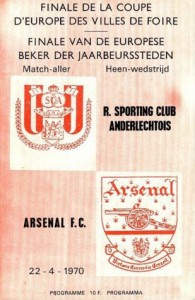 In 1968 and 1969 the Gunners made it to Wembley to the League Cup Final. Despite losing both, 1-0 against Leeds United in 1968 and 3-1 against Swindon Town in 1969, the good times at Highbury were about to bloom. In 1969/70 Arsenal took part in the Fairs Cup (now Europa League) and overcame Anderlecht 4-3 over two-legs in the Final. Even better was to come the following season. Given the historic nature of Arsenal doing the Double, Storey does devote two chapters to the achievements of that memorable season for the Gunners. However, it wasn’t all glory, glory as Storey saw it.
In 1968 and 1969 the Gunners made it to Wembley to the League Cup Final. Despite losing both, 1-0 against Leeds United in 1968 and 3-1 against Swindon Town in 1969, the good times at Highbury were about to bloom. In 1969/70 Arsenal took part in the Fairs Cup (now Europa League) and overcame Anderlecht 4-3 over two-legs in the Final. Even better was to come the following season. Given the historic nature of Arsenal doing the Double, Storey does devote two chapters to the achievements of that memorable season for the Gunners. However, it wasn’t all glory, glory as Storey saw it.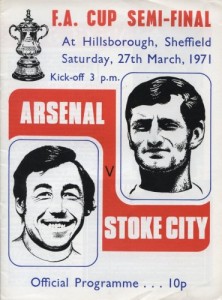
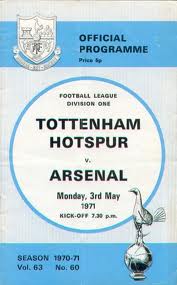 Storey recalls the highs of those events in Chapter Twelve, (“I’ll always have Sheffield”), but Stoke also had unhappy memories later that season when Storey was injured in the fixture against the Potters at Highbury. It meant he missed the title decider at Tottenham and he admits he felt something of an outsider as the team celebrated the title win and observed that he, “…knew a little of the emotional pain and bitter disappointment Jimmy Greaves experienced when he was injured during the World Cup and watched as his replacement Geoff Hurst became a national hero…”. Still carrying the injury, missing the Cup Final looked inevitable and Storey recalls an intriguing episode in which he believes Bertie Mee tried to ensure he missed the game. Peter Storey having declared himself fit was then put through his paces by the manager which Storey saw as an “…unbelievably gruelling fitness test…” However, Storey came through the test, but on the day in the Final against Liverpool he lasted about an hour before limping off.
Storey recalls the highs of those events in Chapter Twelve, (“I’ll always have Sheffield”), but Stoke also had unhappy memories later that season when Storey was injured in the fixture against the Potters at Highbury. It meant he missed the title decider at Tottenham and he admits he felt something of an outsider as the team celebrated the title win and observed that he, “…knew a little of the emotional pain and bitter disappointment Jimmy Greaves experienced when he was injured during the World Cup and watched as his replacement Geoff Hurst became a national hero…”. Still carrying the injury, missing the Cup Final looked inevitable and Storey recalls an intriguing episode in which he believes Bertie Mee tried to ensure he missed the game. Peter Storey having declared himself fit was then put through his paces by the manager which Storey saw as an “…unbelievably gruelling fitness test…” However, Storey came through the test, but on the day in the Final against Liverpool he lasted about an hour before limping off.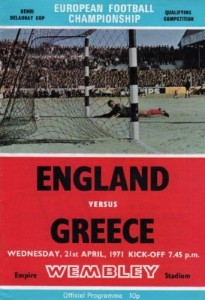 Success at club level brought Peter Storey international recognition and his first cap came in 1971 in a 3-0 win at Wembley against Greece. Sir Alf Ramsey recognised the versatility of the Arsenal man and in winning 19 caps he played at both right and left back and in midfield for his country. Not bad for somebody who many thought was just an “assassin and a thug…”
Success at club level brought Peter Storey international recognition and his first cap came in 1971 in a 3-0 win at Wembley against Greece. Sir Alf Ramsey recognised the versatility of the Arsenal man and in winning 19 caps he played at both right and left back and in midfield for his country. Not bad for somebody who many thought was just an “assassin and a thug…”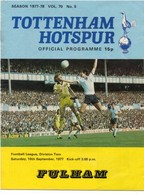
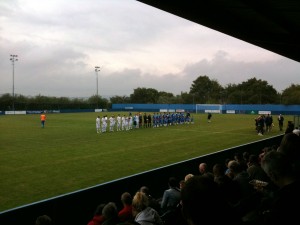 Pre-season friendlies. Love them or hate them, they are part of the build-up to any new football season. For clubs, players, managers and fans they are a mostly a positive thing; however friendlies can have a downside too. Take for instance my visit to Throstle Nest and the Farley AFC v Leeds United XI fixture.
Pre-season friendlies. Love them or hate them, they are part of the build-up to any new football season. For clubs, players, managers and fans they are a mostly a positive thing; however friendlies can have a downside too. Take for instance my visit to Throstle Nest and the Farley AFC v Leeds United XI fixture.